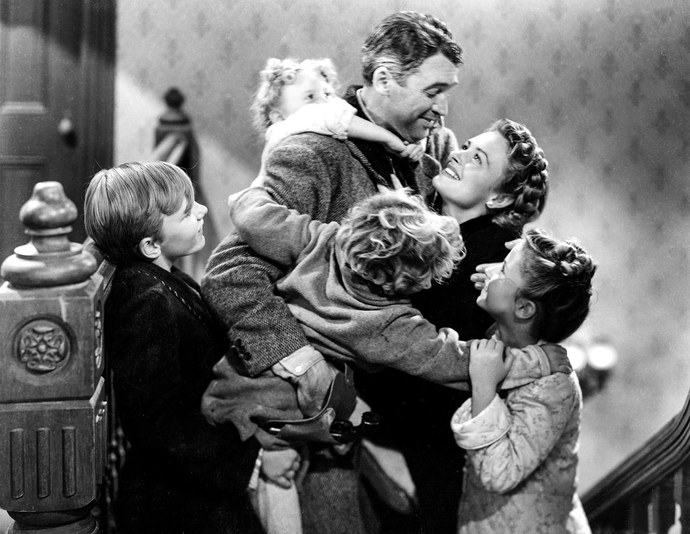Here Comes the Snow

It’s
Macy’s Day. My partner and I are bundled up on the
couch, watching a livestream of the floats scuffing down 34th
Street. A high school marching band stomps onto the screen, whatever song
they’re attempting lost in the racket.
“What is it with the marching bands?”
“Don’t know. Isn’t it weird how they have that, like, gun choreography?”
“Yeah. Gross.”
My partner and I have had this exact conversation every year since she started watching the parade with me. It has become part of the tradition, just like having never heard of the “rising young pop star” lip-syncing on the Ocean Spray float. Or cringing through the musicals. Or pretending I’m not tearing up just a little when Santa finally arrives on his glittery, Verizon-sponsored sleigh.
Macy’s Day kicks off my annual, month-long immersion in Christmas Entertainments. For one month of the year, from American Thanksgiving to Boxing Day, I set aside critical snobbery and subject myself to a regiment of Claymation, sitcom pastiches of A Christmas Carol,low-budget Hallmark movies featuring George Wendt as Santa Claus.
My partner indulges me—I suspect she even likes some of it—though she still refuses to watch It’s a Wonderful Life. “It’s so stressful,” she groans, as rum-sotted, unshaven George Bailey throws himself from the bridge one more time. “Why would you watch something so depressing?”
Christmas is a dim, cold season.Winter days give too easily to solemn darkness and a splintering, minor-key cold that makes one feel both glad and ashamed to be indoors.
Christmas shouldn’t be depressing, but it is.
That’s why the protagonists of all your favourite Christmas movies are such dissatisfied people.Their lives aren’t terrible by any stretch. Most of them are business owners, or well-heeled white-collar workers. At the very least, they lead securely middle-class lives. But they’re all missing something: friendship, love, a meaningful relationship with their distant father, some ineffable want.
Christmas intensifies want.
Want intensifies guilt and panic.
Hugh
Martin understood. When he presented his lyrics for
“Have Yourself a Merry Little Christmas” to Frank Sinatra, Sinatra agreed to ignore
the bitterness of the title, on the condition that Martin “jolly up that last
line.” Martin complied. The verse beginning “But at least, we all will be
together, if the Lord allows,” now ends “Hang a shining star upon the highest
bough…”
Here is Martin’s original: “Until then, we’ll have to muddle through, somehow.”
Words for when you’re laid off but the electric bill’s past due and the baby’s cough is getting worse. Listen close and you’ll hear an ultimatum, with an implied “or…” too terrible to comprehend: what happens tomorrow when things get worse?
I’m standing outside a Great Canadian Oil Change in Saskatoon. A Charlie Brown Christmas plays over and over on a television inside the shop. I can’t hear the dialogue or that melancholy choral score. For all I know, the sound’s turned off. It doesn’t matter. I know the script by heart and I’ve seen the whole thing play through twice already. Linus is about to say “lights, please” for the third time. It’s 3AM.
My parents gave me my gift early this year: a ticket to Montreal so I can spend Christmas with my partner. The flight leaves in twelve hours. It’s an extravagance. Probably more than they could spare. Definitely more than I deserve. My mother apologizes every Christmas. She says, “I know it’s not much.” My parents live in New Brunswick, so going to Montreal means ditching them for the holidays again.
My nose is running and my eyes are wet. Because of the cold.
“Isn’t there anyone who knows what Christmas is all about?!” Charlie Brown famously wonders. Linus volunteers a reading from Luke, academically sound but unsatisfying. Linus, a child, mightn’t have seen that Christmas is where nostalgia meets ice and regret and financial anxiety.
Nostalgia is, of course, a longing for ignorance, a longing to return to a time when you did not have the problems you have now.
My Christmas immersion is not an exercise in nostalgia. Watching How the Grinch Stole Christmas is something I look forward to, but not backwards. As much as I’d like to retreat from the pressures of grown-up life, there’s really nothing to retreat to. Strange as it sounds, I have no particular memories, good or bad, of childhood Christmases.
But I do remember lying in bed every year as Christmas turned into Boxing Day, thinking how short-lived it all was. How nothing lasts. How tomorrow will feel worse.
I think about George Bailey, even in summer. George, and Scrooge, and all the lovelorn career women of the Hallmark movies—they occur to me, ambassadors of this horribly sad season, when everything is cold and dark and too-much. I think of how they muddle through this season, their unhappiness turning into want, want turning into need, until that one brief, climactic moment when their want is met, their spirits lift, and they suddenly get Christmas. It’s a manipulative, treacly plot structure and it never fails.
It’s the goodness, not the sadness, that kills me. George Bailey suffers for my sake, for the possibility that some year I will see him mobbed by his wife and children and neighbours and his brother suddenly home from the war as they bring in gifts and money enough to save him from prison, to give his children gifts; that he will believe in kindness and love and angels and safety, and in that too-brief respite of grief and guilt I, too, might…
George Bailey’s happiness can’t be mine. I know as soon as the mob has stopped singing “Auld Lang Syne” he’ll start wondering how a man repays the sort of kindness that can never be repaid. I have been here with George so many times. Standing on the bridge. Credits roll. Christmas turns to Boxing Day. I’m left with only a memory of George Bailey’s happiness.





